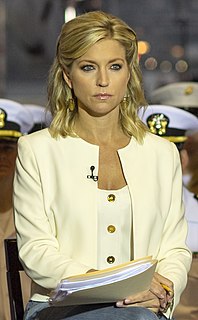A Quote by James Risen
I’ve been an investigative reporter for a long time, and almost always, the government says that [‘you can’t publish that because of the national security risk’] when you write a story. And then they can never back it up. They say that about everything. And it’s like the boy who cried wolf. It’s getting old.
Related Quotes
National security is a really big problem for journalists, because no journalist worth his salt wants to endanger the national security, but the law talks about anyone who endangers the security of the United States is going to go to jail. So, here you are, especially in the Pentagon. Some guy tells you something. He says that's a national security matter. Well, you're supposed to tremble and get scared and it never, almost never means the security of the national government. More likely to mean the security or the personal happiness of the guy who is telling you something.
We have a media that goes along with the government by parroting phrases intended to provoke a certain emotional response - for example, "national security." Everyone says "national security" to the point that we now must use the term "national security." But it is not national security that they're concerned with; it is state security. And that's a key distinction.
My name is growing all the time, and I’ve lived a very long, long time; so my name is like a story. Real names tell you the story of the things they belong to in my language, in the Old Entish as you might say. It is a lovely language, but it takes a very long time to say anything in it, because we do not say anything in it, unless it is worth taking a long time to say, and to listen to.
You're sad-looking," she said. "My grandson used to be such a happy boy. He used to write me stories. I remember the first story he ever wrote me, 'Once upon a time, there was a boy.' And that became 'Once upon a time there was a boy who wanted to fly.' And they kept getting better and better over time. I never found out if the boy got to fly." I gave her a small smile. If only she knew the boy's wings had been clipped.
It's funny - for a long time, I didn't know I was writing a book. I was writing stories. For me, each story took so long and took so much out of me, that when I finished it, I was like, Oh my gosh, I feel like I've poured everything from myself into this, and then I'd get depressed for a week. And then once I was ready to write a new story, I would want to write about something that was completely different, so I would search for a totally different character with a different set of circumstances.
That's the music that I play at home all the time, Joni Mitchell. Court and Spark I love because I'd always hoped that she'd work with a band. But the main thing with Joni is that she's able to look at something that's happened to her, draw back and crystallize the whole situation, then write about it. She brings tears to my eyes, what more can I say? It's bloody eerie. I can relate so much to what she says. "Now old friends are acting strange/They shake their heads/They say I've changed."
There was a point where if you had told me I was going to be a national morning anchor, I would probably have been terrified. But now, I feel prepared. I've been in the business for almost 20 years now. I'm almost forty years old and I've been doing this for a long time, so I felt like, "Okay, I'm ready to do this."
I had a lot of great lakes of ignorance that I was up against, I would write what I knew in almost like islands that were rising up out of the oceans. Then I would take time off and read, sometimes for months, then I would write more of what I knew, and saw what I could see, as much as the story as I could see. And then at a certain point I had to write out what I thought was the plot because it was so hard to keep it all together in my head. And then I started to write in a more linear way.
The story he [Todd Willingham] told me was this: He woke up to a fire. He ran out of the house and couldn't run back in to save his children, and that was enough to get me interested. ... There's a writer in me that's like, ... this is a great story. ... I have a good friend, who was my neighbor at the time, and I told her about it. ... She had been a reporter, and she was like, "Let's go investigate it."
It can take years. With the first draft, I just write everything. With the second draft, it becomes so depressing for me, because I realize that I was fooled into thinking I'd written the story. I hadn't-I had just typed for a long time. So then I have to carve out a story from the 25 or so pages. It's in there somewhere-but I have to find it. I'll then write a third, fourth, and fifth draft, and so on.
































